Autobiography of Marie Iverson Waite Compiled by Pat Waite Clausse
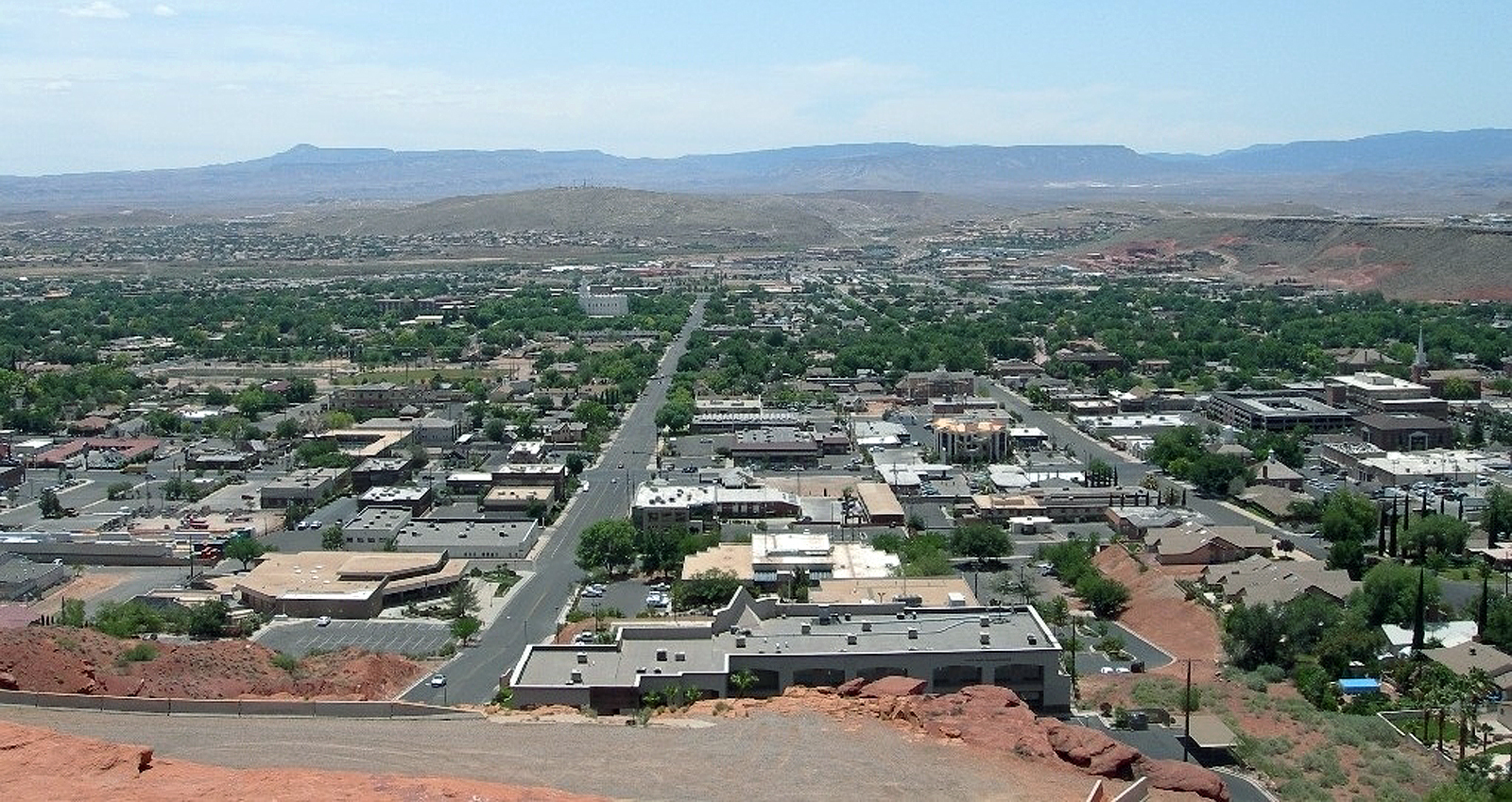 St. George from the red hill
St. George from the red hill
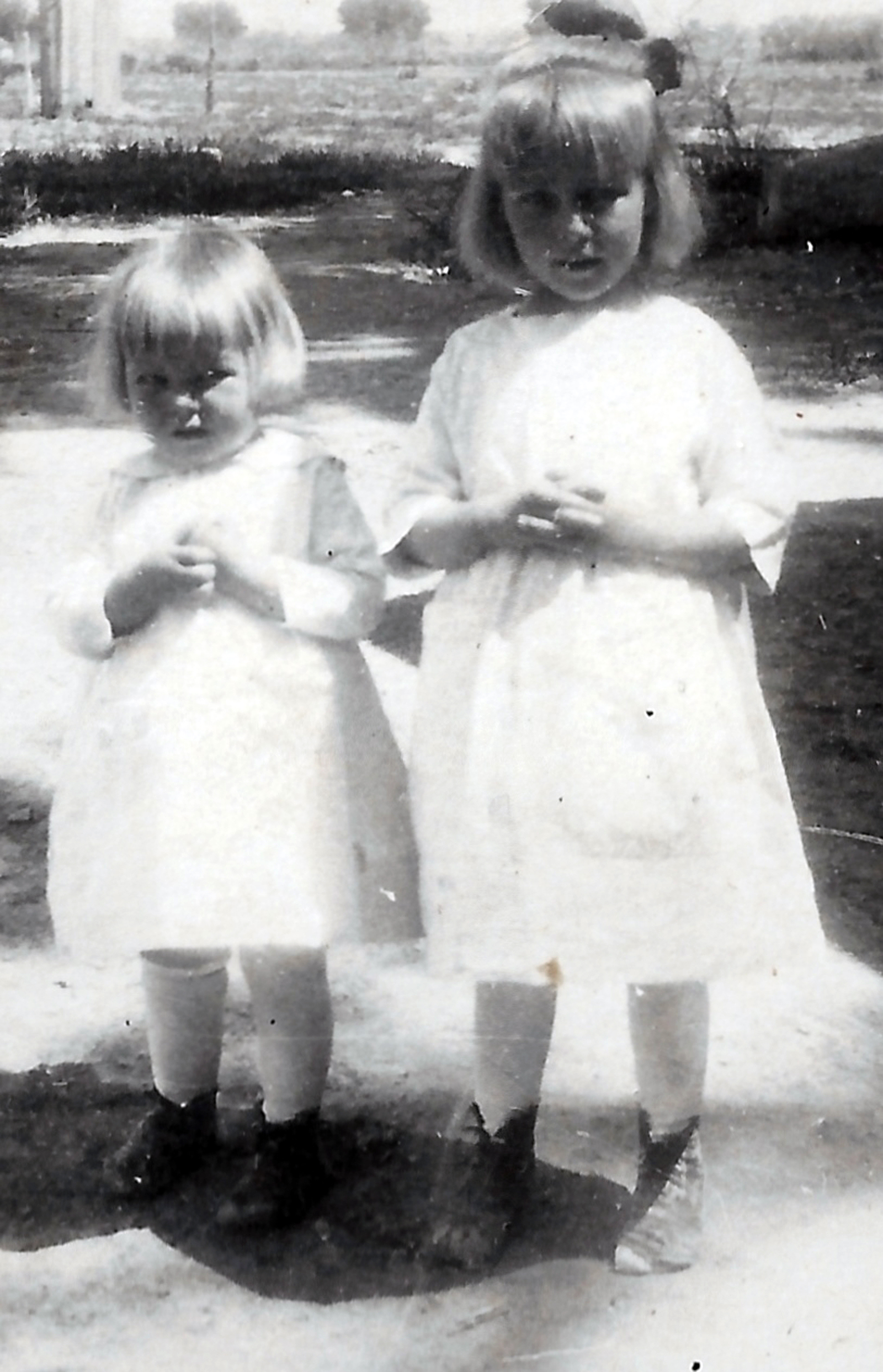 Me and Bernice
Me and Bernice
On 6th of December 1919, my life's journey on earth began, in the town of St. George, Washington County, Utah. I was born to Leoma and Victor Iverson, then age 20 and 28.
My mother Leoma McCain was born 3 August, 1898, and my father Victor Moses Iverson was born June 24, 1892. I am their second child. My older sister, Bernice, was born 6 Jan 1918 in Kaolin, Nevada.
My parents had just recently returned to St. George from living in Montana where my father and his brother, Levi, had been working on a large wheat ranch. My father found work, driving a freight wagon from St. George to Bundy's Store in Mt. Trumbull, Arizona. Some of my father's brothers and sisters were homesteading in Mt Trumbull. My mother's parents were also on homesteads there. My parents' bought 640 acres from my mother's brother Harold. The homestead didn't have a house on it so my father bought wood from an old house in St. George and hauled it to our land where he used it to build a one room house.
When it was time for me to be born my mother and Bernice went to St. George to stay with my father's sister Annie, her husband Roy Whipple, and my Grandmother Iverson. They lived in a small house up on the "Red Hill", on the north side of town. From up on the hill you get a beautiful view of the St. George Temple to the south.
It was in this little house that I was born at 9:30 pm. My mother was attended by a Dr. D.A. McGregor, with the help of Aunt Annie and my grandmother. Aunt Annie was soon to have her first child.
My father was away in Arizona freighting at the time and I've been told that when he returned he was so disappointed because he didn't get a son. When I grew older and was told this I felt very badly. I started to develop an inferiority complex and it still hurts when I think about it. So be careful what you say to and about your children.
My parents had a difficult time deciding on a name for me and at first sent in the name of Alma to the Bureau of Vital Statistics. But when it came time to have me blessed they decided I should be Marie. This name I find was used a lot by my Danish ancestors and I never have found an Alma so I'm glad they changed their minds, but they never did have the Vital Statistics Records changed so I had that done years later after I was married and realized I was on record as Alma.
I have always regretted that my parents didn't give me a second name however. Some how I've always felt a little cheated. Most of my Danish ancestors have so many names, like my Grandmother Iverson had 4 given names. So it must be the Danish blood in my veins that has made me wish for more than one given name.
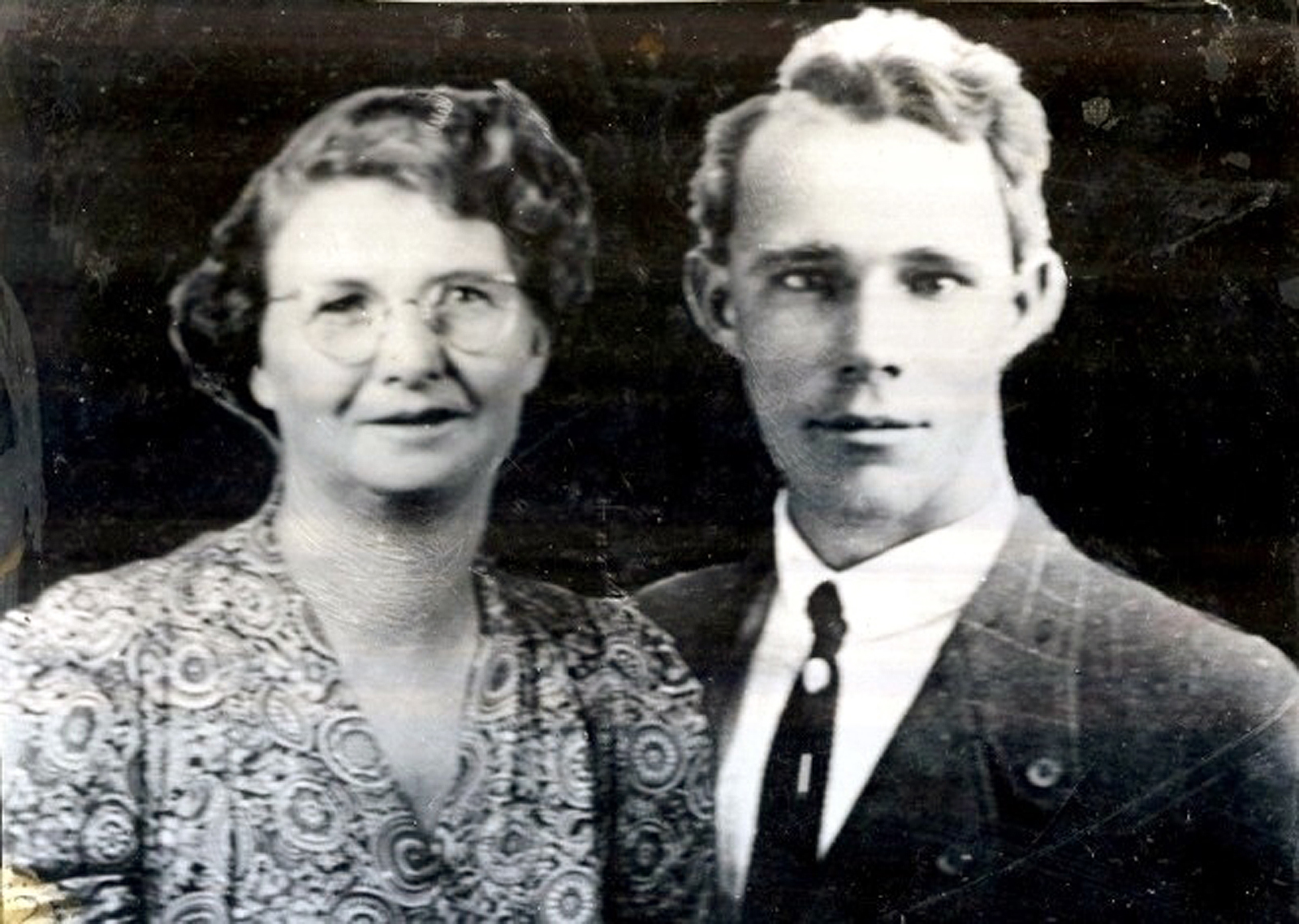 My mother and father
My mother and father
My parent's marriage date was December 23, 1916 in Overton, Nevada. My father was medium height and slender build with blue eyes and brown, wavy hair when young. My mother is on the tiny side, being only 5 feet and on the slender side when young and small even now when she's 84 years of age. She had red hair and green eyes which she has always disliked, especially the few freckles she had. Her complexion has always been delicate and easy to sunburn.
My father was always a gentle, kind man but could lose his temper now and then with us children, if we didn't do things right, but he would soon be sorry and talk to us about it. My father was sick a lot of his life with bad headaches and stomach ulcers. He had a lot of depression because of how he felt and because he couldn't hold a good job and provide for his family as he wanted to. He loved to sing and many times he would grab Mama and they would dance around the room together as he sang.
He was a very spiritual man and had a very strong testimony of the truthfulness of the gospel. He read daily to us from the scriptures and was the head of our home as he exercised the priesthood. He would tell us, "Study and study and pray. Then you will understand the gospel and what God wants you to do on earth." He was like his parents. They were converted to the Church of Jesus Christ of Latter-Day Saints by missionaries in Denmark and they gave up everything, family, friends, home, country and possessions to come to America to be with the Saints because they knew the gospel was the true church of Jesus Christ. My father would have done this also if he had been asked to do so. The gospel meant more than life its self to them. I sometimes wonder what these dear people think of us and the lives we are living. I'm afraid they feel very bad for many of us because we are missing out on so many wonderful blessings that could be ours in this life and the eternities to come if we were living the gospel like we should.
My mother's father was Albert Alexander McCain and her mother was Rhoda Elizabeth McCain. They were both born and raised in Tennessee but their ancestor's came from Scotland, Ireland and England.
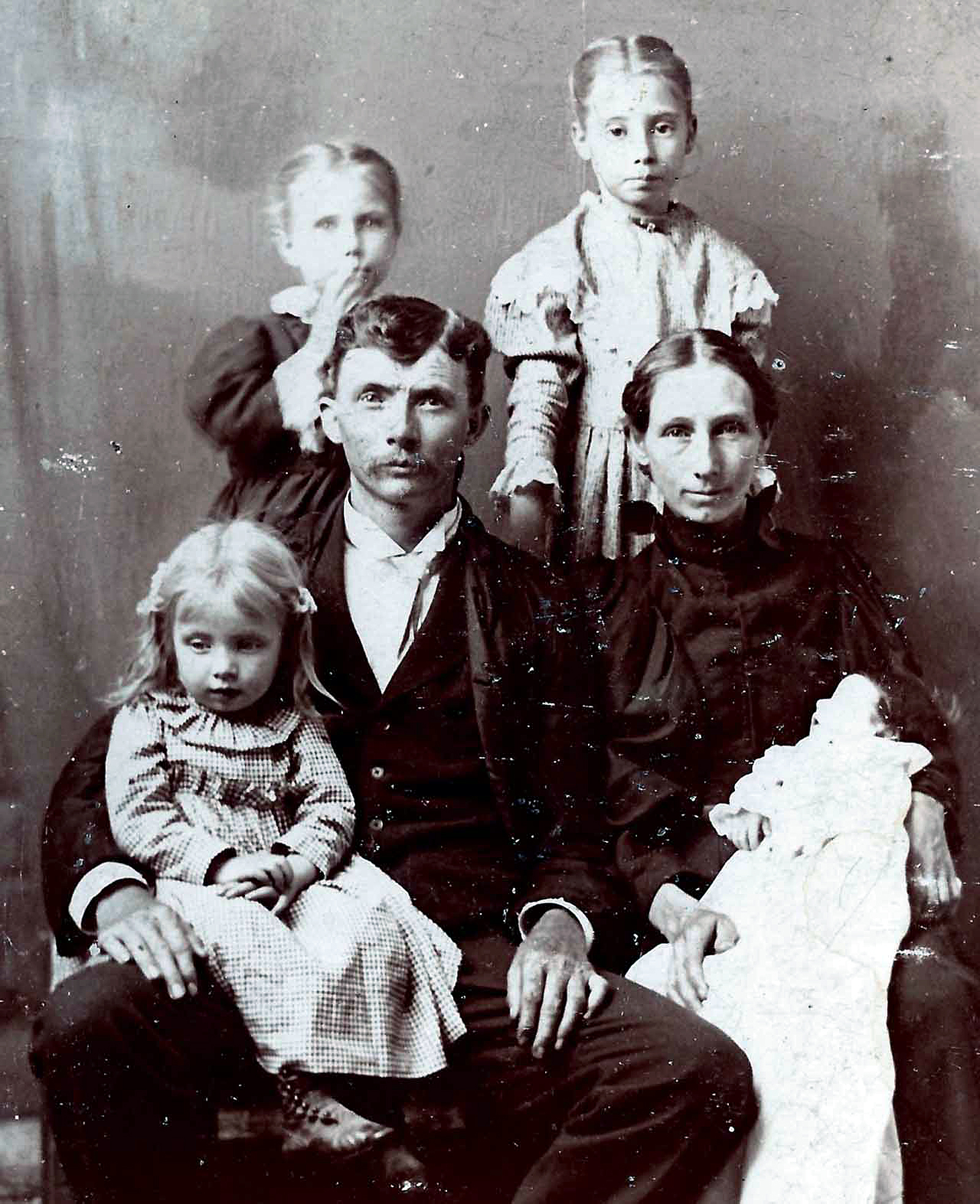 My grand parents Albert and Rhoda McCain with their four daughters.
The baby is my mother Leoma. The picture was taken in Cane Hill, Missouri.
My grand parents Albert and Rhoda McCain with their four daughters.
The baby is my mother Leoma. The picture was taken in Cane Hill, Missouri.
My mother's parents were converted and baptized in Tennessee. They too gave up everything for the sake of the gospel. Their family and friends disowned them and they were threatened and persecuted until they left everything and made their way to Utah so they could live the gospel and worship their Heavenly Father and belong to His true church.
My mother was born in Cane Hill, Cedar County, Missouri as her parents had stopped there for a couple of years to work for enough money to come on to Utah. My Grandfather McCain was a large man with red hair and ruddy complexion and a jolly laugh. He loved to tease his grandchildren and always seemed to have a little peeping baby chick in his pockets that we were always searching for but never found. The more we felt in his pockets the more he would laugh. He was an ideal Grandpa. He was a farmer and a very good singer. He sang in the church choir for years. He died July 19, 1954 in St. George, Utah.
My Grandmother McCain was small and slender and had dark brown hair when she was younger. She wore her hair combed back smooth and done up into a bob at the back, fastened with hair pins and side combs. In the evening she would sometimes take her hair down and we children would brush it for her. She enjoyed having us do this but it would always make her sneeze and we would laugh.
Grandma was so kind and gentle and always busy taking care of her garden, chickens, cooking big meals for us, making quilts and doing things for others. She died September 22, 1960 when she was 93 years old in St. George, Utah.
I wrote Grandpa and Grandma McCain's history years ago and Grant included most of it in the McCain book he published.
My mother was always small and dainty with red hair and green eyes and delicate complexion. She hated her red hair but wore it long as she grew up and after she married for years. I remember her long thick red hair that was long enough for her to sit on. I remember seeing her sitting brushing it until it shone like gold but it was red instead. My Dad lover her long beautiful hair but when short hair became the fashion she wanted to cut her hair because she felt it would be easier to car for but Dad said no, never, no matter how much she coaxed for his consent.
I don't know how old I was the day she got out the scissors and said to me. "I'm going to cut my hair but don't you tell Daddy when he comes home." I said I wouldn't but I felt bad as I watched her cut off her beautiful hair up to just below her ears. She was only about half way through when I looked outside and saw Daddy coming down the lane. I don't know why I don't it, but I ran to meet him and told him Mama was cutting her hair. (I really feel like a brat now.) He really felt bad but the damage was done so he had to help her finish the job. I don't think she ever grew it long again but in later years she usually wore it with a permanent.
My mother was always in our home cooking, sewing, cleaning and working in the garden and taking care of us kids and Daddy. With my father sick so much we were poor and had a hard time making ends meet. But we always seemed happy and we always got by but I'm sure it was real hard for my Mother and Dad both.
But we always lived the gospel and had our prayers morning and night and thanked God for our many blessings. We always had the blessing on the food and our own private prayers. The blessings of our Heavenly Father are what kept us all going.
My Mother was usually gentle and kind but it seems I remember her getting angry and few times and telling some on off. I remember my Dad saying it was her Irish temper.
Mama has always been very talented in crocheting beautiful pieces of lace and things like doilies and lace runners and table covers. She has also made many, many beautiful quilts. Giving most of them away to family and friends but selling some and she made many beautiful quilt tops for the Relief Society.
She always quilted so small and dainty and she always sewed a tiny seam by hand. I remember her sitting doing a lot of mending by hand.
She was always a real good cook making her own bread and when we lived in Mt Trumbull and had a dairy herd Dad would separate the cream and Mama would make butter and shape in one pound, wooden molds and wrap it in her own butter parchment paper that had her name on it and it would be taken to St. George to sell in the market. She had a lot of regular customers that would always look for her butter to buy.
My mother taught junior Sunday school for 20 some odd years in St. George when her ward held church in the Tabernacle and has gone to Relief Society teaching all her life. She works in the temple when ever she can now.
I have written her history years ago but need to bring it up to date. I have it in my Book of Remembrance.
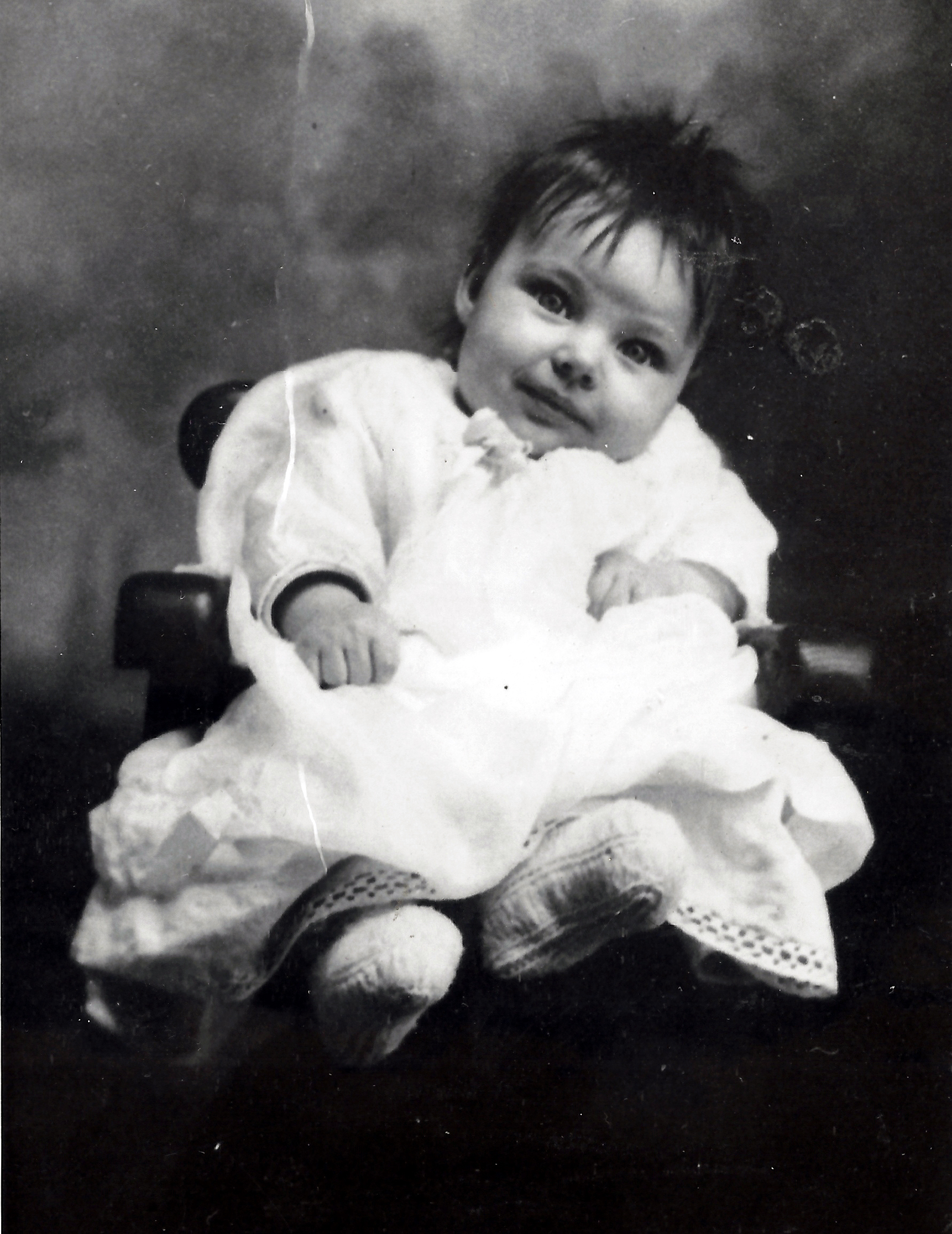 The first known picture of Bernice
The first known picture of Bernice
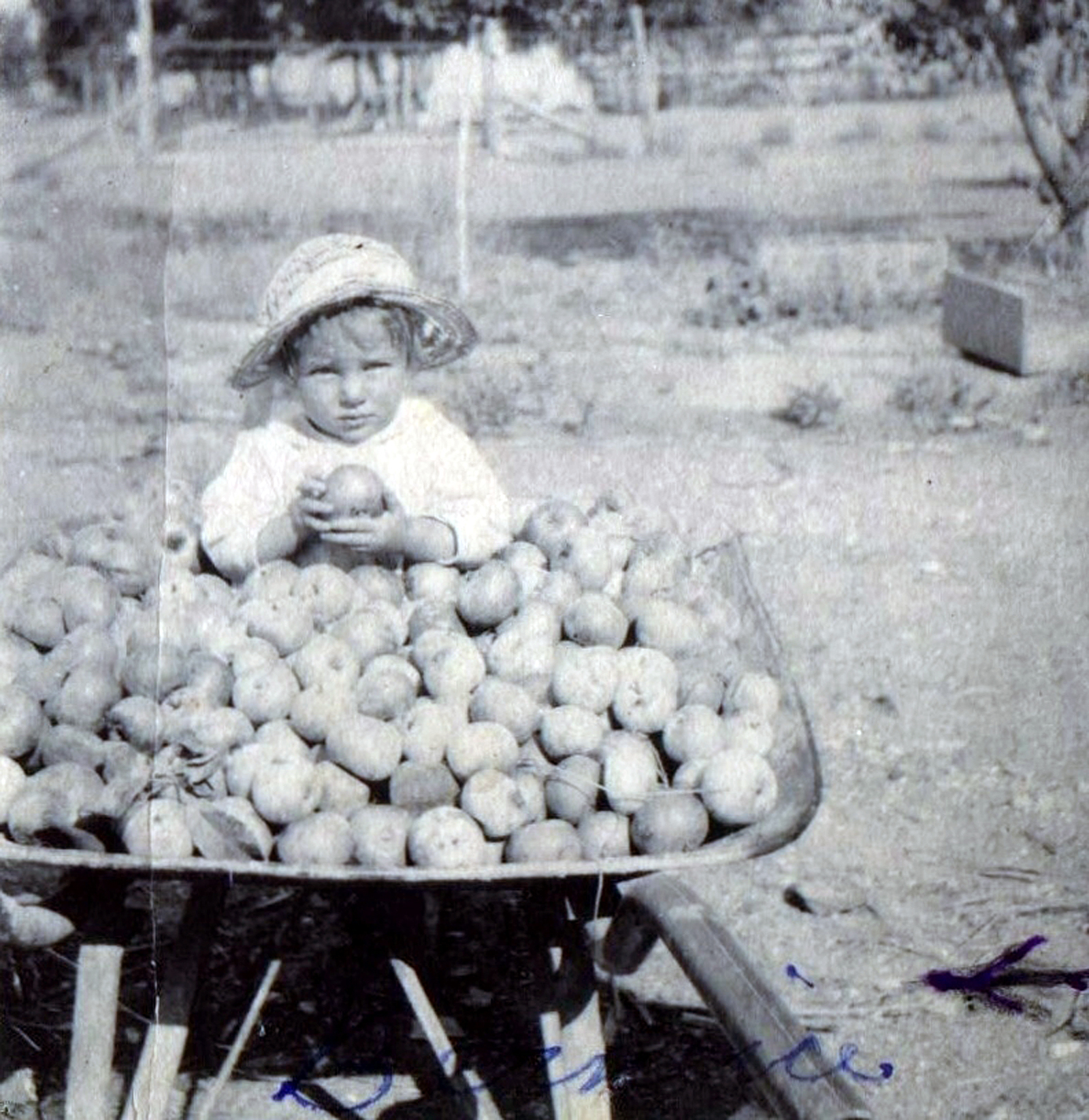 Bernice
Bernice
Some of my earliest childhood memories are of me playing with my sister, Bernice who was around 2 years older than me. At the time we lived at the Gyp mines near Las Vegas. We lived in a white boarded up tent. Most everyone did. I remember my sister became sick and way yin on a cot in the shade of the tent. She had a toy enamel dish pan she really liked. I took it and started running around the tent dragging it behind me. I remember Bernice telling me to put it down but I didn't pay much attention. My sister became so sick that we took her to Las Vegas and they told us she had diphtheria which was a deadly and very contagious disease in those days and caused the death of many children especially.
They quarantined us in a vacated old nursing home. The doctor and county nurse came in to see her. Daddy was the only one of us allowed out to get groceries and he had to change clothes and take certain precautions.
The doctor telegraphed to Los Angeles for the newly developed anti-toxin for Diphtheria. Then they waited long hours and days and it didn't come back on the train as he had planned. Bernice grew steadily worse. I also started with it. Finally the doctor boarded the fastest train and went to L.A. and found that the telegram hadn't even been delivered yet because it was the weekend.
He obtained the medicine and came back as fast as he could. But it was too late for my beloved sister. She soon passed away. My parents said that poor doctor broke down and cried because he couldn't save her. But I remember this tall slender doctor in the dark suit sat down, took me over his knees, bottom side up and gave me a shot to save my life. I remember how I kicked and cried.
I didn't know my sister had died but I remember my Dad coming to me all dressed up in his light gray suit. He knelt down by me and ask if I knew where Bernice was. I said, "Yes, she is in the bed in the other room." My father said, "No, she has left us." But I insisted that she was in the other room so I took him in to show him and the bed was made up nice and smooth and she was gone. I never saw her again but they told me they dressed her in a white dress with a blue ribbon in her hair.
No funeral was allowed or any relations or anyone came because to her dying of diphtheria. Everyone was so afraid. My father even had to have an old junk man with an old truck come and hauled her casket to the cemetery.
We went back later to see her grave and I'll always remember it was in late afternoon and the old grouchy caretaker came to let us in the gate. There were tiny pink rambling roses climbing on the fence and I reached out to touch one and that man yelled at me and told me not to touch those roses. They tell me I was so lonesome and lost after my sister died. My father eventually wrote a song about me missing her.
After she was buried and it was all over my broken hearted parents decided that Mama should take us children and go to her parents, Grandpa and Grandma McCain's and that she should not go back home because it would be too painful. So she did this.
My father went back to the Gyp Camp and took most everything we had and burned it because of being afraid of the diphtheria germs. He had made Bernice and I a little table and 2 chairs and painted them red. We really liked them. He burned all our clothes including Bernice's so my Mother only has one little dress left of hers that she wore when she was smaller.
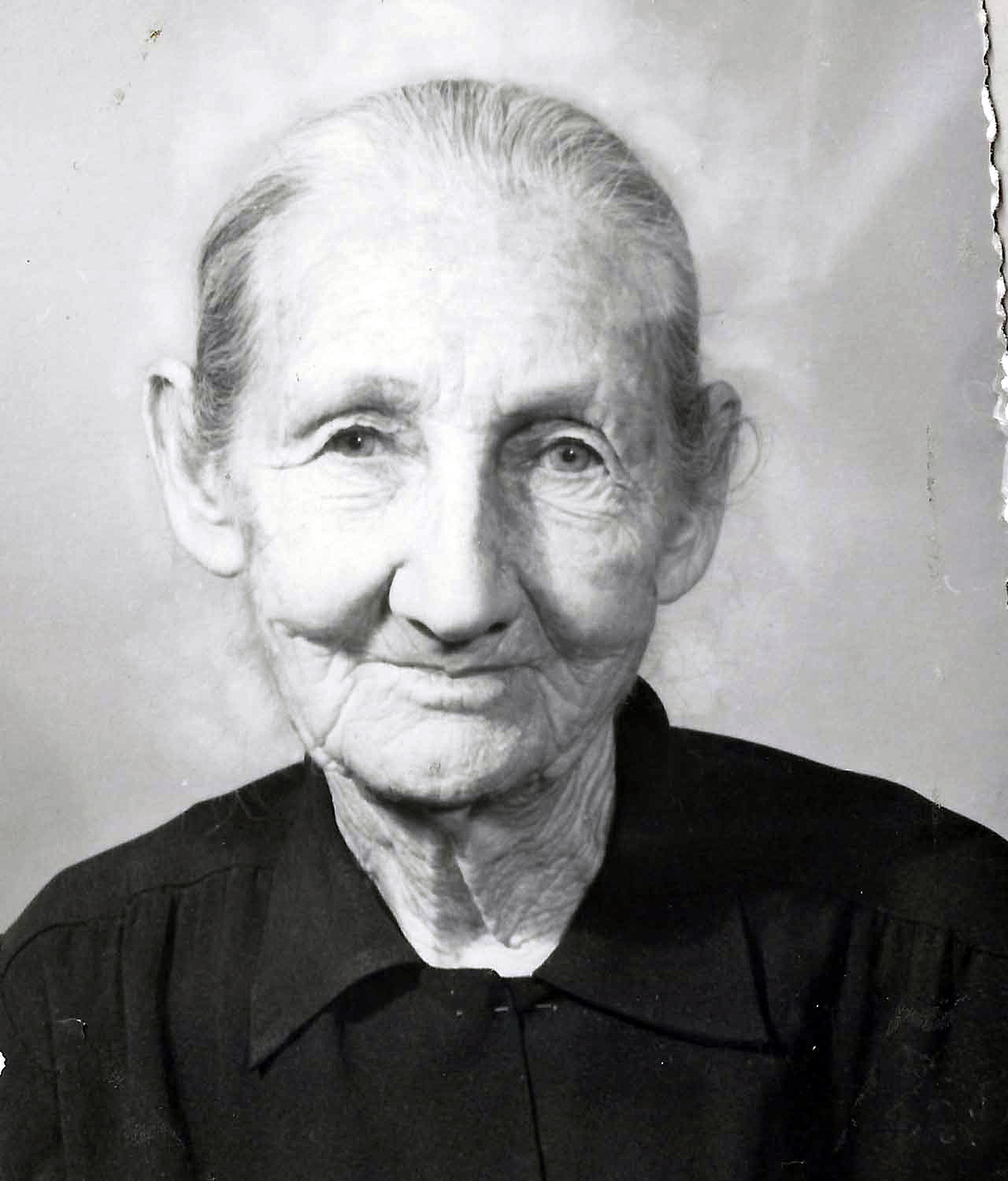 Rhoda Elizabeth Chamberlain
Rhoda Elizabeth Chamberlain
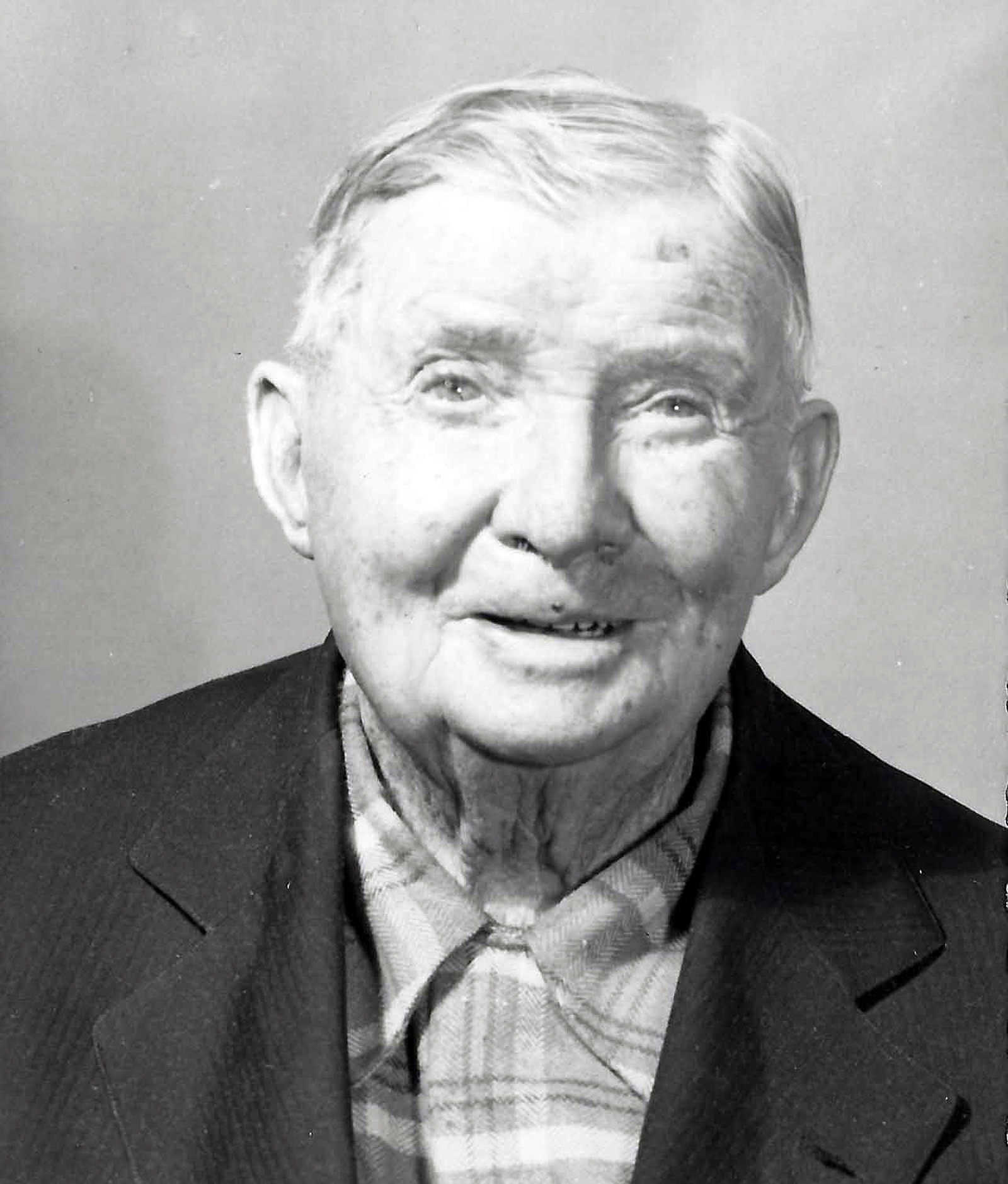 Albert Alexander McCain
Albert Alexander McCain
Grandpa was a large man with ruddy complexion and red hair. I always loved to go visit Grandpa and Grandma McCain. Grandma was tiny with dark hair which she wore in a bun. I don't think she ever weighed over 100 pounds. She usually was around 90. Her health was delicate.
Grandpa used to tease me and tell me that the first time he ever saw me, I was about a year or less and was sitting in a galvanized tub with a blanket in it. (They used to do this when they didn't have play pens.) Anyway, he told me that he stooped down to talk to me and I took one look at him and started to cry as loud as I could.
He would sit in his chair as the grandchildren played around. He would make the peeping noise of a baby chick. The children would hear it and listen and wonder where it came from. They would look all around and he would be silently laughing inside. Then we would get closer to him because the sound came from there. We would end up running our little hands down in his pickets and all the time he was shaking with laughter.
Grandpa and Grandma McCain lived at Mt Trumbull for a long time before trading their dry farm for a farm in Bloomington, Utah. I loved to go there. How well I remember being at their place there and the fun times we had with cousins and relatives.
I remember Grandma had a garden there that was fenced with chicken wire to keep out the jack rabbits. Here I remember she grew green onions and a few other things that could stand the hot, dry weather. Grandpa once planted some watermelons over by his pond of water. Then he would have us grand kids help him carry buckets of water to each watermelon hill. To get us to do it cheerfully he would describe to us how good watermelons were and what they looked like. Then he would say, "So, if you don't help me carry water you can't have any when they get ripe." That would spur us on to greater effort.
Grandpa used to tell us about some Yo-Hoo's of his that lived up on the red hill above Bloomington and that if we weren't good he would have them come get us and fly away to their nest. We were pretty careful to be good for Grandpa.
Grandpa had a real hound dog like they had in Tennessee. His name was Old Bally. How I remember waking up at night by hearing Old Bally baying at something. It's a long ago haunting sound in my memory that I can almost hear again when I wake up some nights.
They had one room off the kitchen built back into the hill. They stored their There they stored their good because it was cool. (No electricity.) There were shelves of fruit and they had a big screened in milk cupboard with several shelves. Here they set their large, flat pans of milk to keep cool and for the cream to rise to the top. It was thick and yellow and it could be skimmed off to be churned into butter or to be used in other ways. You never see cream like that now. It was so good. Us kids loved to spread this thick sweet cream on a slice of bread and sprinkle on a little sugar. It was delicious. It was always dark in this storage room and Grandma had a coal black cat with yellow eyes she called Old Tom. He was a good mouser. I sometimes would go into this room with her and all I could see would be Old Tom's yellow eyes shining. I kept close to Grandma's skirts. She said he wouldn't hurt me but I wasn't going to give him a chance.
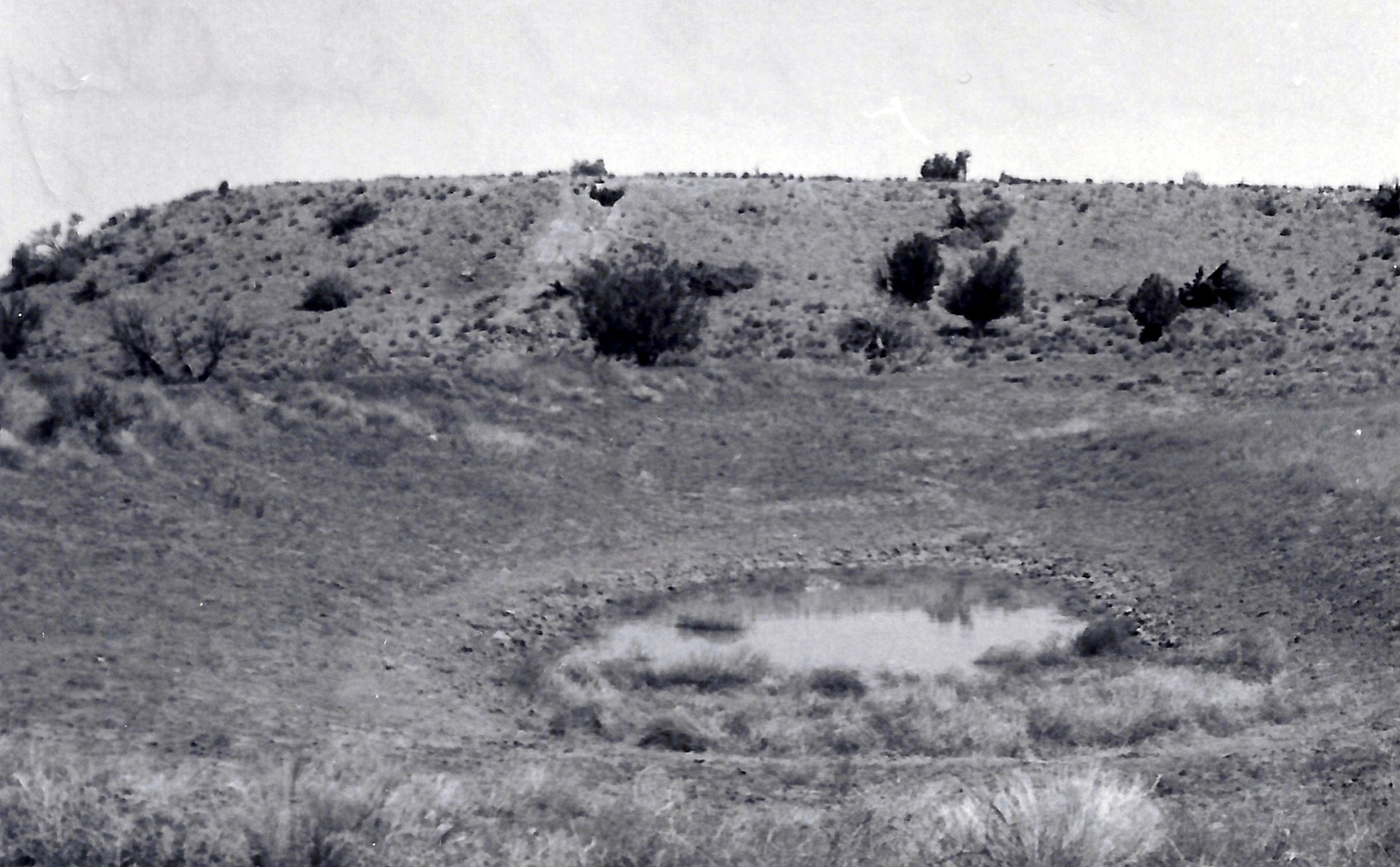 Pond to catch rainwater, I was baptized here
Pond to catch rainwater, I was baptized here
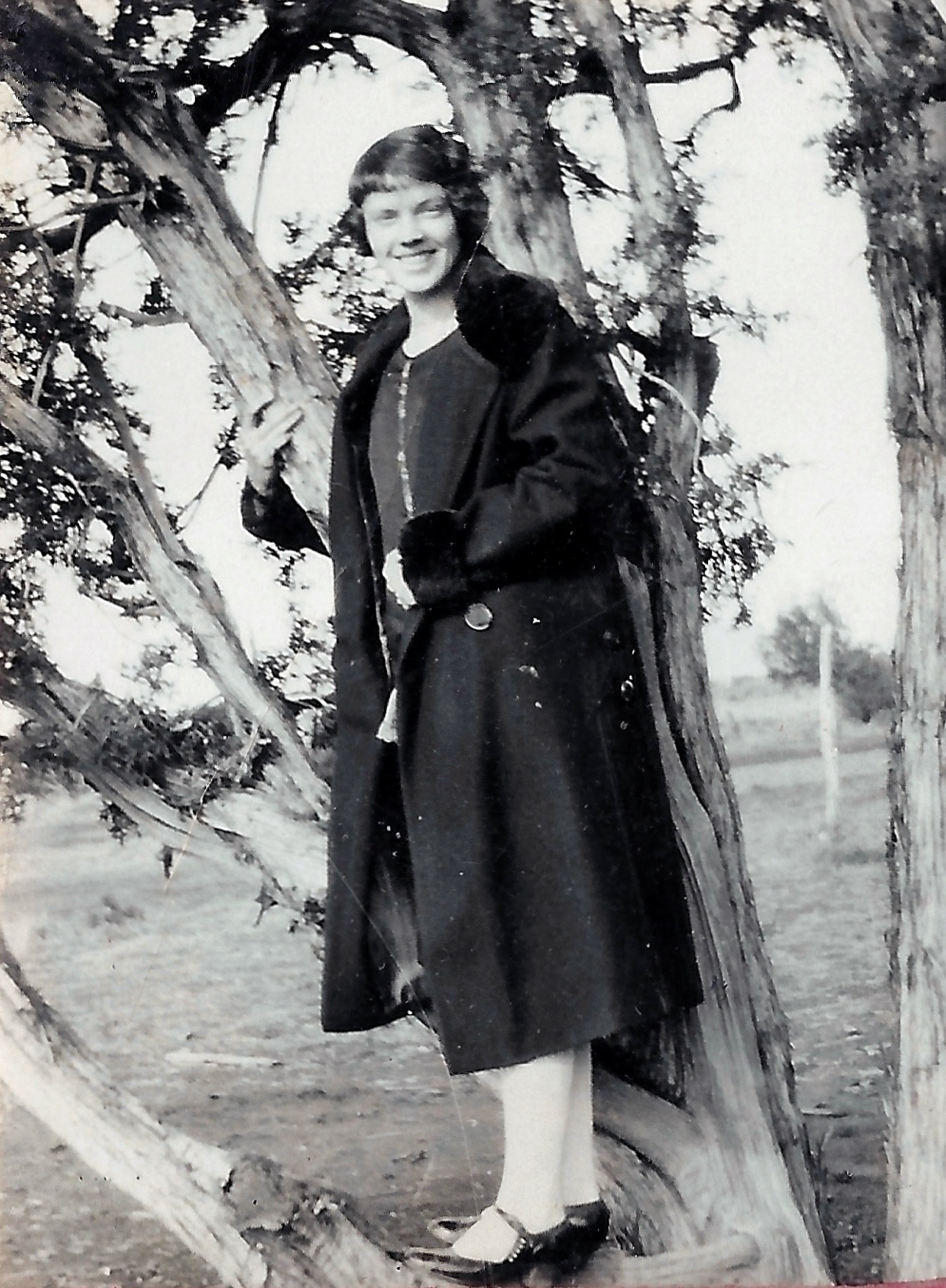 Dorothy Alldredge
Dorothy Alldredge
We and many of our relatives lived in Mt Trumbull for quite a few years. My Grandparents McCain and Grandma Iverson and a lot of our relatives of both sides also lived at Mt Trumbull at that time. It was all ranching country but some tried to dry farm. Some "wasn't" very successful because of no water and not enough rain. Everyone had ponds that would fill when it did rain. These would water live stock and people alike. Some had several ponds with those for home use fenced off from the livestock. Some people built cisterns which they would fill for home use.
I loved our life at Mt Trumbull which was from the time I was around 6 to probably 12 or 14. There were no luxuries at all but just the bare necessities and hard work, but we had a lot of wonderful times with our relatives and the people of the community. I especially remember going to the early school grades where the first 8 grades met in a little weather beaten one room school house with one teacher, Mrs. Dorothy Alldredge.
My brother Budd and I used to walk two miles to school. Once in a while we would ride horses. I remember how cold it was sometimes in the winter with the cold wind blowing against us. Sometimes there was snow on the ground a foot deep. We would be so cold our hands and feet would be numb by the time we got to school and as we stood around the big pot bellied stove in the corner our hands and feet would really hurt as they thawed out.
I remember once when we were walking to the school and the snow was a foot deep. We were walking carefully down the tracks a wagon had made and we came face to face with 2 coyotes walking in the tracks from the opposite direction. We all stopped and eyed each other for what seemed like a long time to me. Those coyotes didn't look very friendly. I remember their yellow eyes. I could feel my little brother Budd crowding close behind me and trying to hide from them. Finally, the coyotes stepped carefully out into the deep snow and waited until we passed. Then they came back into the packed track and resumed their journey.
Another time we 3 were walking and was supposed to find all the stock in the hills of our 640 acres and take them to water them to another pond around a mile. We had a bell on one of the cows so as we hunted we would stop and listen for the bell. We finally found the cows but not the young stuff.
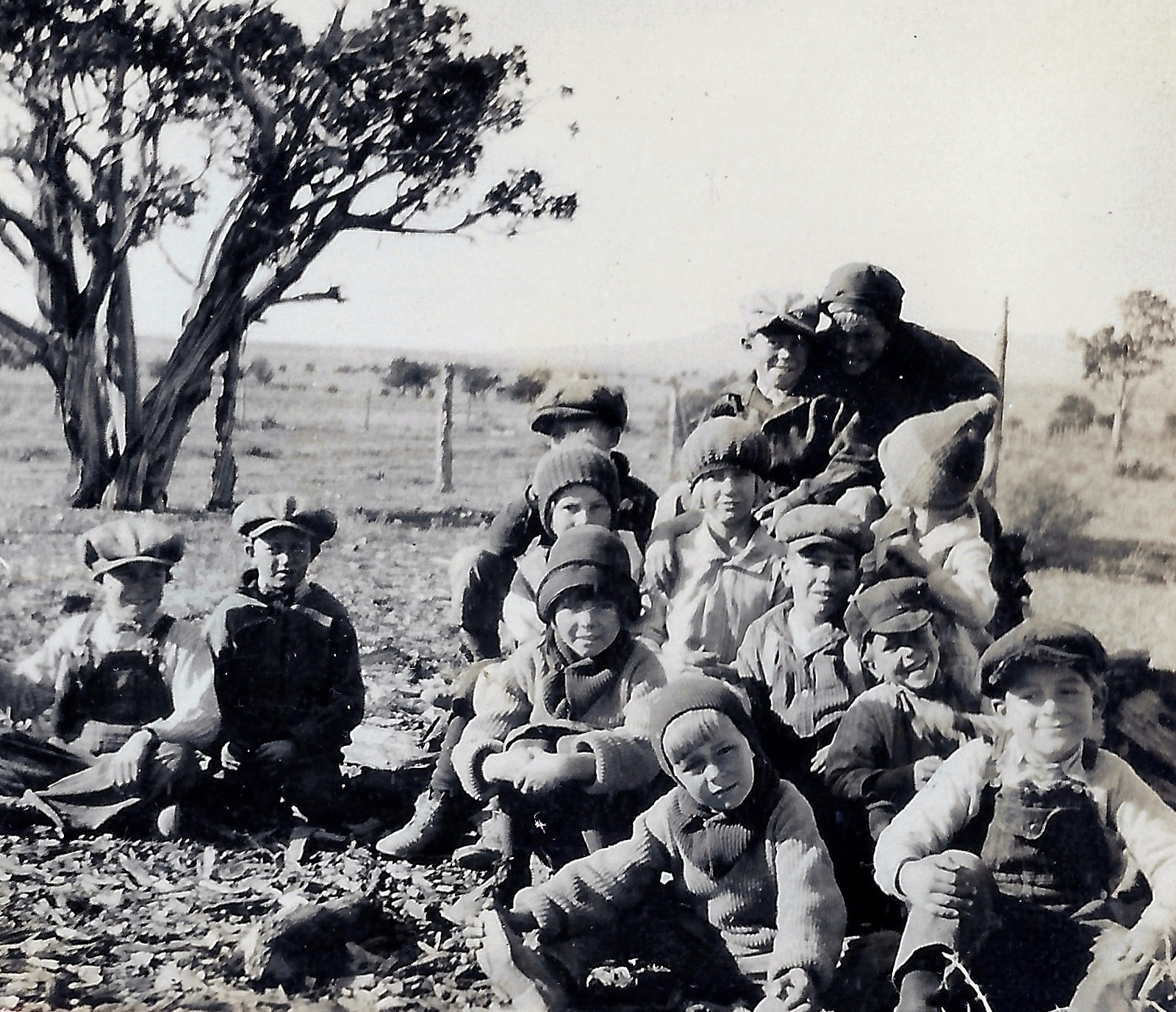 My class in Mt Trumbull School. Bud is on the left in the front, with a no brim,
dark cap and light hair. I am just behind him.
My class in Mt Trumbull School. Bud is on the left in the front, with a no brim,
dark cap and light hair. I am just behind him.
We drove them down the trail to the pond and when we got them home, Dad ask, "Did you water the heifers?" We said no, we couldn't find them. He was real upset and told us to get out there and find those heifers and go water them. So we did and finally found them. By then it was nearly sundown. We hurried those cattle right along but by the time we got back to our gate it was dark. We turned the heifers in the gate and then started down the road toward home which was a quarter of a mile away.
As we bravely walked down the road we saw something strange move under a tree by the road. Bud said," What's that?" I bravely said, as my voice shook, "Oh, it must be a black stump." Budd said, "I saw it move." Without another word we all turned and started back the other way. As we started going through the gate onto the neighbor's property we heard our Dad call out and say, "Hey, where you going?" What a relief that was to find out the "black stump" was him sitting under the tree, waiting for us. He always did get a kick out of scaring us "ever once" in a while.
We owned 640 acres and it was all fenced with 3 strands of barb wire. Our land was hilly, primitive land covered with sage brush, juniper, or cedar trees as we called them, and pinion pine. We also had several kinds of cactus and brush and grass. We had a dairy herd of about 8 to 10 cows from what I remember and a lot of young stuff. My Dad would milk by hand and use a hand operated milk separator that had two spouts. The cream would come out of one spout and milk out of the other. We either made butte to sell or shipped the cream to St. George. We also had several horses. My horse was a blaze faced sorrel gelding named Dugan. I loved to ride bare back just as well as using a saddle.
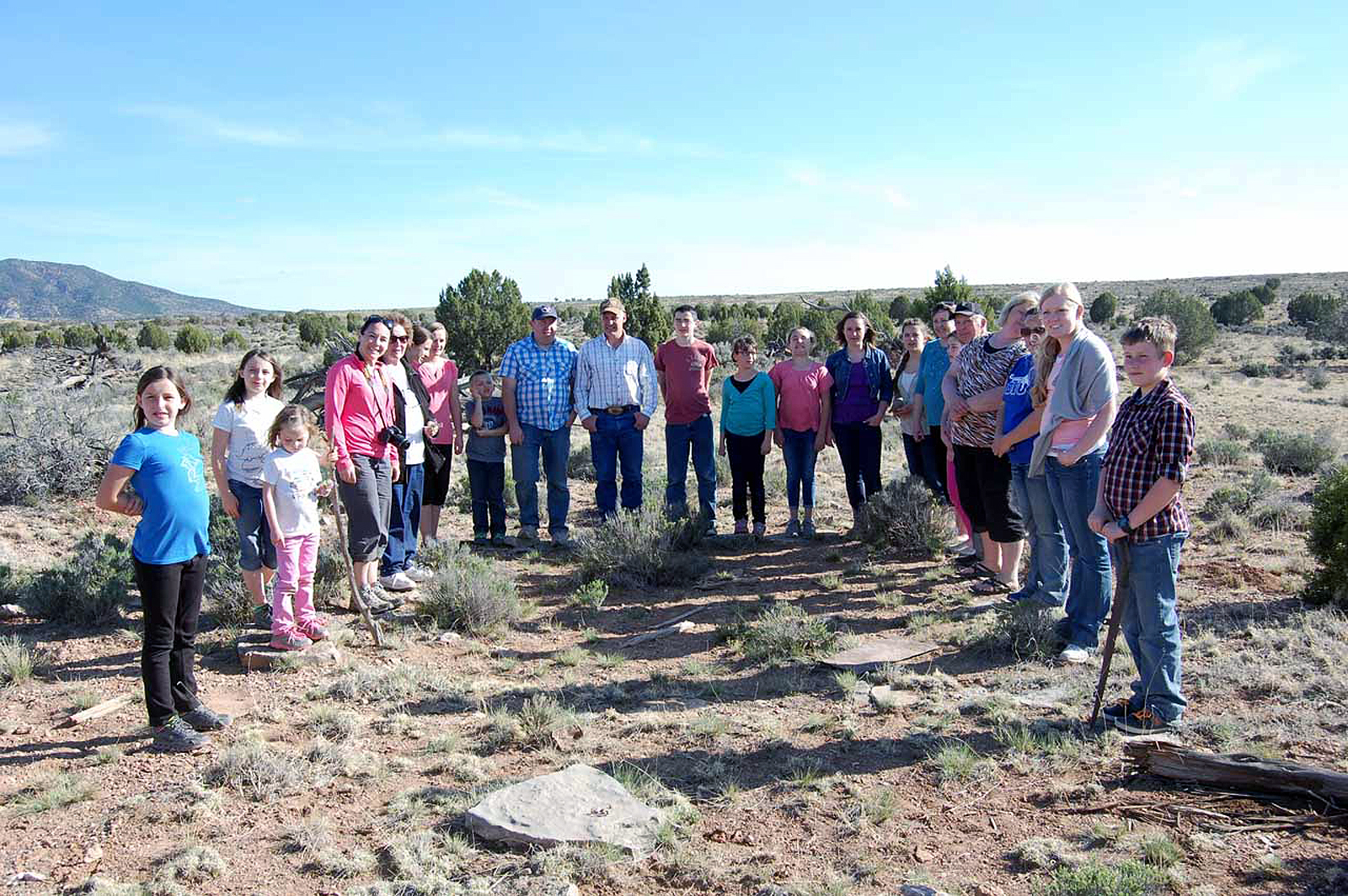 Family members standing on the remains of the foundation of our home in Mt.
Trumbull
Family members standing on the remains of the foundation of our home in Mt.
Trumbull
Once when I was 8 and Budd was 6 we had to drive our herd 5 miles to a neighbor's pond to water them. Our pond was nearly dry. As we were driving them on home a thunder storm met us with strong wind and sharp rain. The cattle all turned tail and ran with the storm. We whipped our horses and tried to get in front and turn them but they wouldn't turn. Finally the storm passed and we were all soaking wet. We rounded up the cattle and headed toward home again but it was around sun down. How relieved we were when we saw our Dad riding along toward us. He had been real concerned about us.
Once my Dad was galloping along on old Dugan out across some of our ranch. Budd and Grant were about 5 and 7, I guess, and they were near by and saw the horse step in a hole and fall. It knocked my Dad out cold so he just laid there. They went over where he was and sat down to watch him. When he finally came to the first thing he heard was a deep sigh and then he saw their little, concerned faces peering down at his. He said, "Why didn't you run and tell Mama?" They said, "Well, we wanted to know if you were dead first."
We had to really watch out for rattlesnakes and tarantulas, but the little horny toads were our favorite pets. We caught them in all sizes and they had beautiful marking in buffs, oranges and browns. We would build play houses among the brush making our walls with rows of rocks. In the winter, especially at school or over to Aunt Artie's when there was snow on the ground, we would play fox and geese and other games.
We sometimes went to Grandma or Aunt Artie's for holiday dinners. I remember Aunt Artie always made a lot of pies and would cover a whole bed with pies. But she had 3 big sons and a husband that were always kidding each other about who could eat the most pies. Uncle Albert recited poetry and I remember sitting out on their porch that run the full length of the house at evening time when the clouds were pretty and listen to Uncle Albert recite. He would wave his arms and really put feeling into it. I liked it in a way, especially the clouds, but I remember even then thinking he was putting a little too much into it.
We loved to go visit Aunt Artie and Uncle Albert's family. She was my mother's sister. They had a large family of boys and girls and we had lots of fun times together. They lived in a large lumber house 2 miles from us. We had a regular trail between our place and theirs and it went through Grandpa McCain's place. We would walk over and spend the day. Uncle Albert built an ice house and filled it with ice and sawdust in water, cutting chunks from the pond.
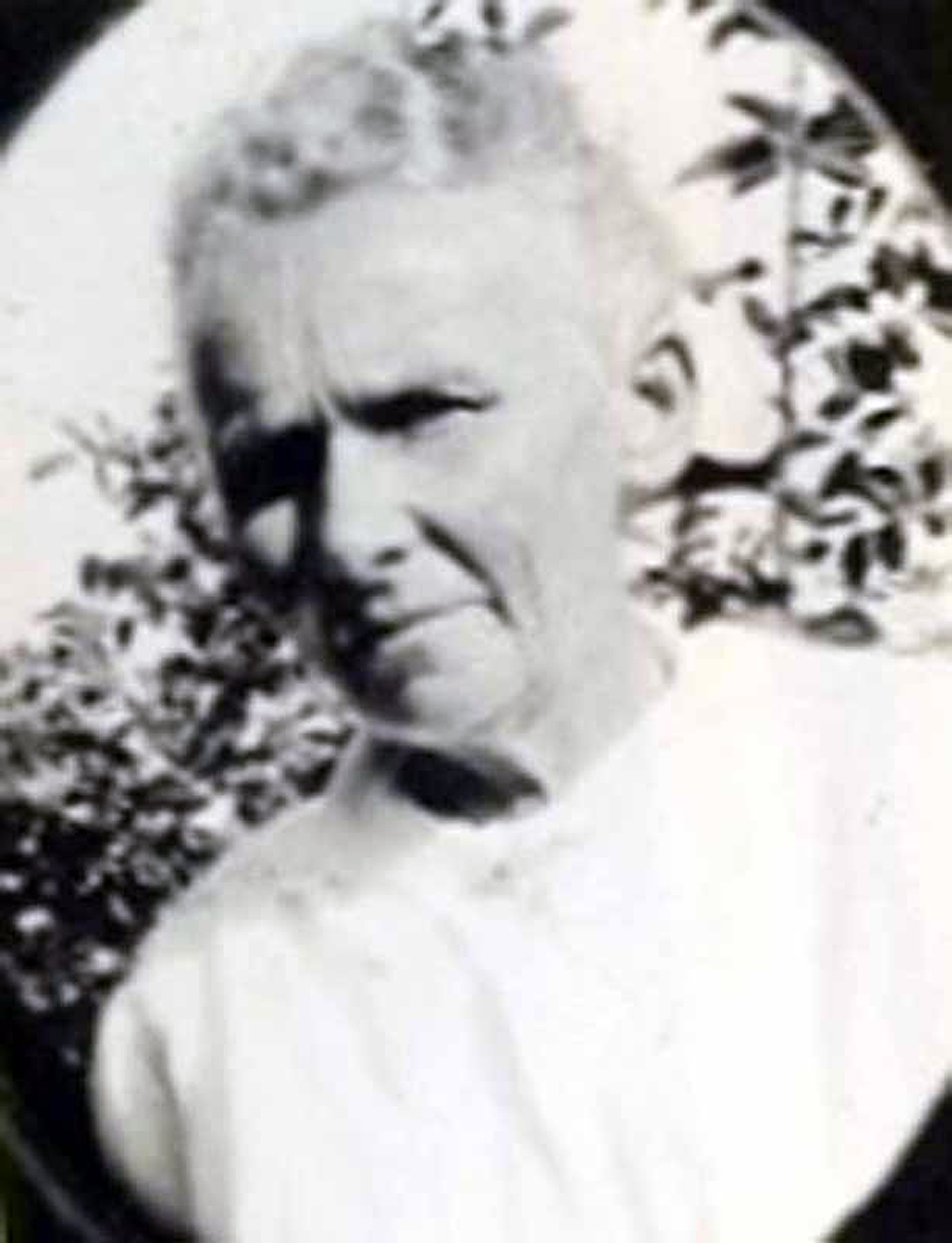 My grandmother Juliana Johannah Dorothea Christensen Iverson
My grandmother Juliana Johannah Dorothea Christensen Iverson
My Grandmother Iverson also lived at Mt Trumbull for a while with my Uncle Willard Iverson. Grandpa Iverson had died. Uncle Willard's wife had died and he had a little girl a few years older than me to raise so Grandma helped him. We visited them quite a lot. How well I remember this Grandma giving me delicious pieces of hot, fresh baked bread with homemade butter. How good it was. This is the Grandma that came from Denmark. She was small and had white hair she wore in a bun. Everyone called her Aunt Hannah but her real name was Julianna Johanna Dorothea. She is the one we named Julie Anne after.
She was so neat and clean and I remember her telling me stories about Denmark and the things she used to do as a child and young girl. Her father was a blacksmith and she used to help him including pumping the bellows for the forge.
Grandma once taught me to count to 10 in Danish but I didn't keep practicing so I forgot. She also taught me to sew a fine seam by hand. She would say, "You must first learn how to take tiny, even stitches by hand, then you can learn to sew on a machine." Her stitches were so neat and even and she made most of her clothes by hand.
She spent the last several years working in the temple in St. George and rented a little house across the street, but she died in 1937 at Mt. Trumbull and is buried there.
We always had fun times at Mt. Trumbull. The people for miles around would get together for celebrations and special occasions. On the 4th and 24th we always had pot luck picnics, programs, games, horse races and races and western dances at night. Cowboys would all join in and our music was a fiddle and piano. When I got old enough to dance I loved it. People would stay for the dances, put their little ones to sleep on a quilt in the corners or on the benches.
They always played "Home Sweet Home" for the last dance. We always wanted to dance that dance with the boyfriend we liked the best. After the dance parents would put their sleeping children on quilts in the bed of the wagon and drive the bumpy ride home. I remember hating to get up out of the wagon and go to bed after we got home. Later there were times when some of us kids that lived the closest together would walk to the dances and back.
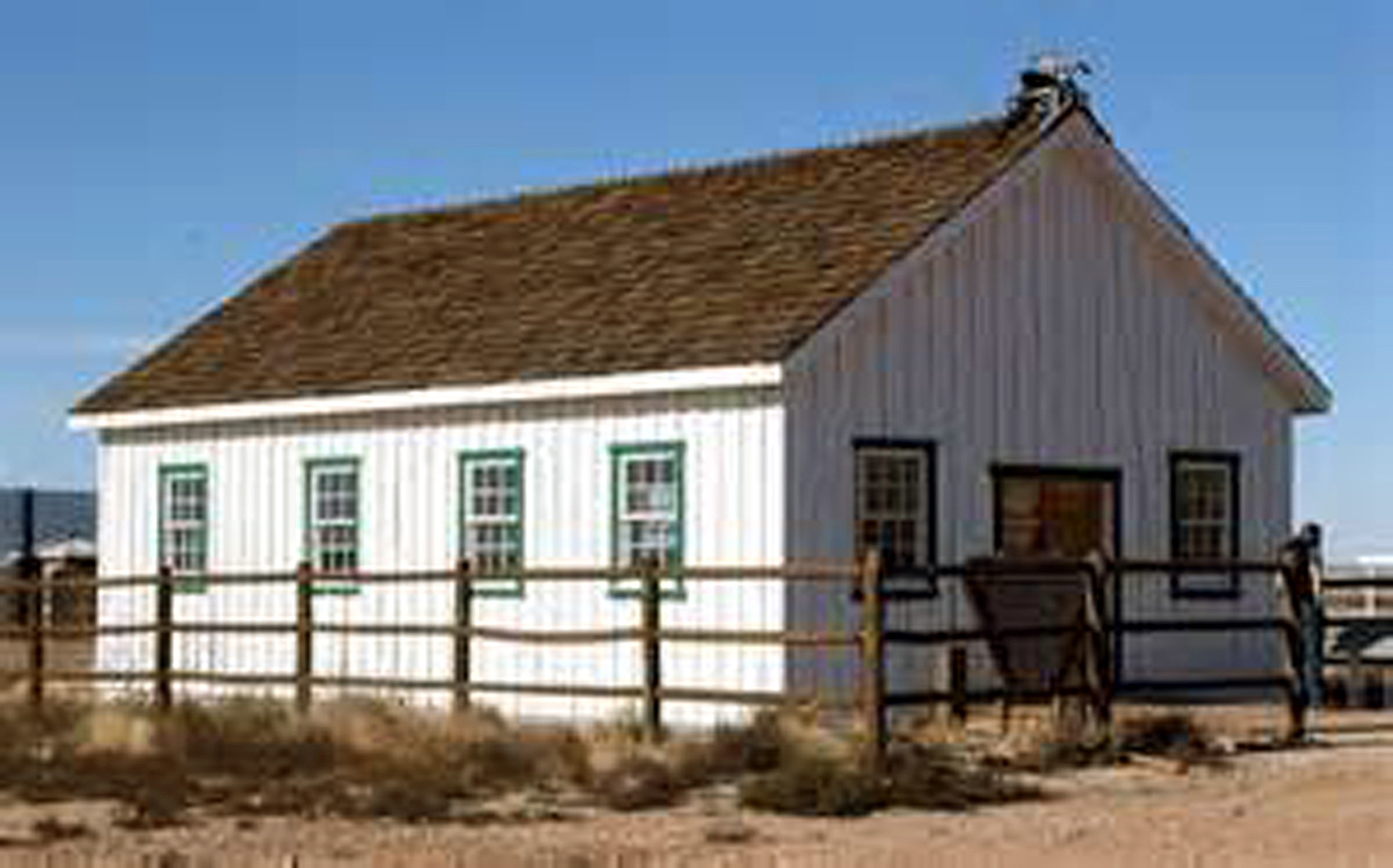 Mt Trumbull schoolhouse where we held church meetings and social events
Mt Trumbull schoolhouse where we held church meetings and social events
One kind of cactus that grew at Mt. Trumbull was the Prickly Pear. It had large, flat leaves covered with spines but in the spring it would bloom with beautiful pink flowers. Then the flower would turn into a red pear shaped fruit about the size of a plum. You picked them carefully and they were good to eat with a tart fruity flavor.
One time some of my cousins were over and all us little kids were playing. One of my older cousins names Cora Snyder said she knew where some Prickly Pear fruit was and she would take us out to get some. So we all tagged along and really none of us were old enough to know one cactus from another. But we all followed her out into the brush where a lot of bushy cactus was that had little light green buds on. Cora said these were prickly pear and for us all to have some so we all watched her and she picked one and ate it so we did too. Some of us didn't think it tasted very good so we didn't eat much but we soon noticed our mouth was hurting so we all ran to the house. Some of the smaller kids were crying (like my brother Budd). Our parents got to looking in our mouths and found that they were filled with tiny cactus spines. So they had a bad time trying to pull them out. I remember seeing my cousin Cora standing over Grandma's corner of the house rain barrel, throwing water in her mouth and scratching her tongue with here fingers. We learned a couple of lessons that day. To leave cactus alone and not to believe everything Cora said. I don't think I ever did get all those tiny slivers out of my mouth.
My Daddy was always sickly and would have some real bad sick spells when he would be delirious and wouldn't know what he was doing. There were no doctors out at Mt. Trumbull and the nearest was 60 miles away in St. George and that was a day's travel in those days. So the people had to rely on what home remedies they had and the power of prayer and being administered to by some one holding the priesthood.
When I was between 7 and 10 there were several times Daddy would get real sick in the middle of the night and Mama would have to wake up me and my brother Budd. We walked to the nearest neighbors 1 1/2 miles away to get him and my Uncle Martin 2/3 miles away to come administer to my father. I remember how frightening it was for us little kids to go down the trail through the dark trees for help. Many times there were coyotes howling near by or an owl would be hooting. But we would go pound on the neighbor's door to wake him and then he would go for Uncle Martin. Once though he wasn't home so we walked clear to Uncle Martin's.
But it was always worth it because as soon as they would come and lay their hands on my father's head and ask the Lord to help him get better he would soon go to sleep and then be all right the next day. It was such a wonderful comfort to have the power of the priesthood to help in time of sickness.
My first boyfriend was from Mt. Trumbull when I was 11 or 12. His name was Lincoln Bunday and I really thought he was special. We went to some parties together and a few dances. Then my family moved into St. George so I didn't see him much and when World War II started he joined the Air Force and died flying a fighter plane over Germany.
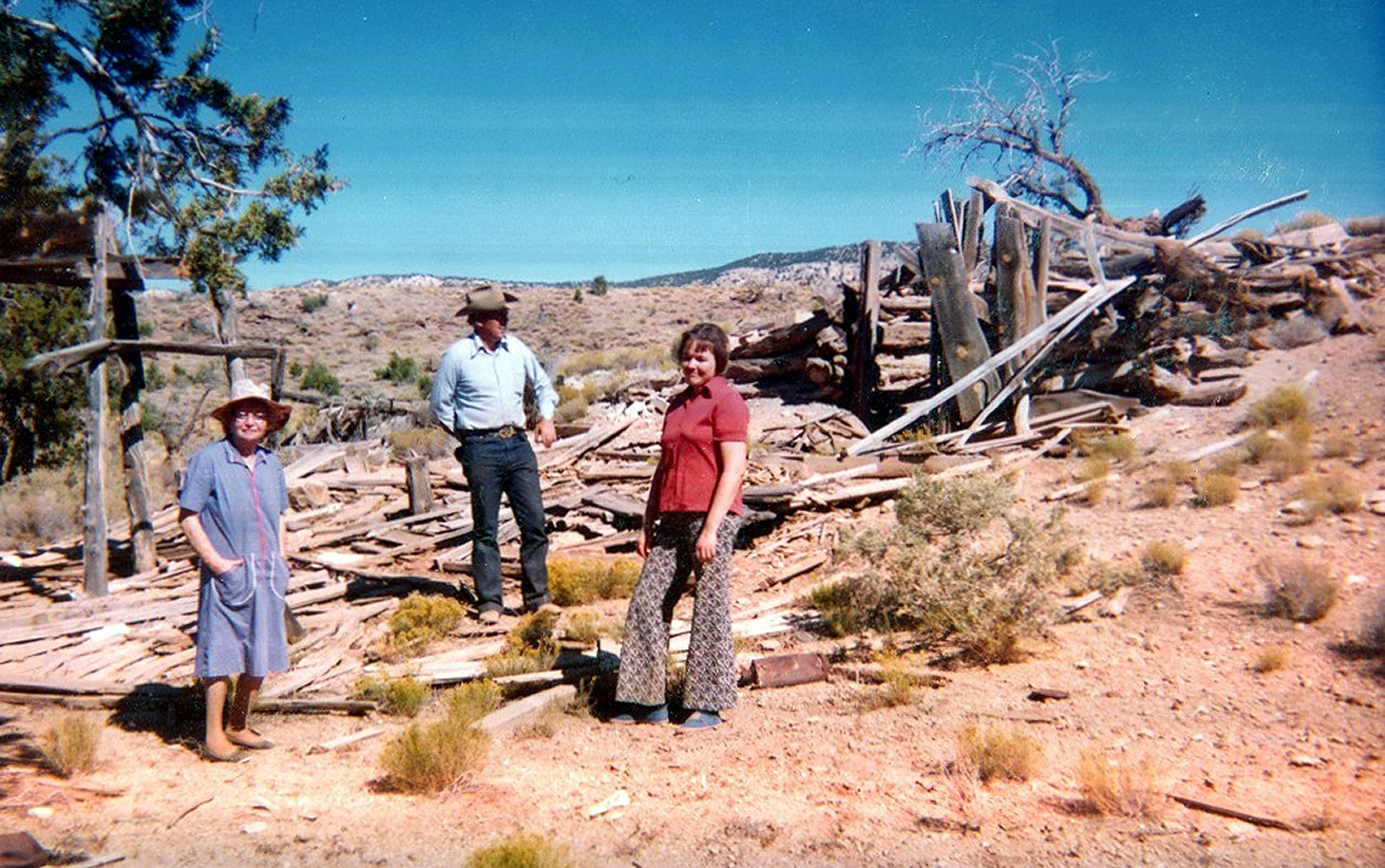 My mother Leoma, brother Keith and Sister Sharon at Grandpa and Grandma McCain's
home in Mt Trumbull
My mother Leoma, brother Keith and Sister Sharon at Grandpa and Grandma McCain's
home in Mt Trumbull
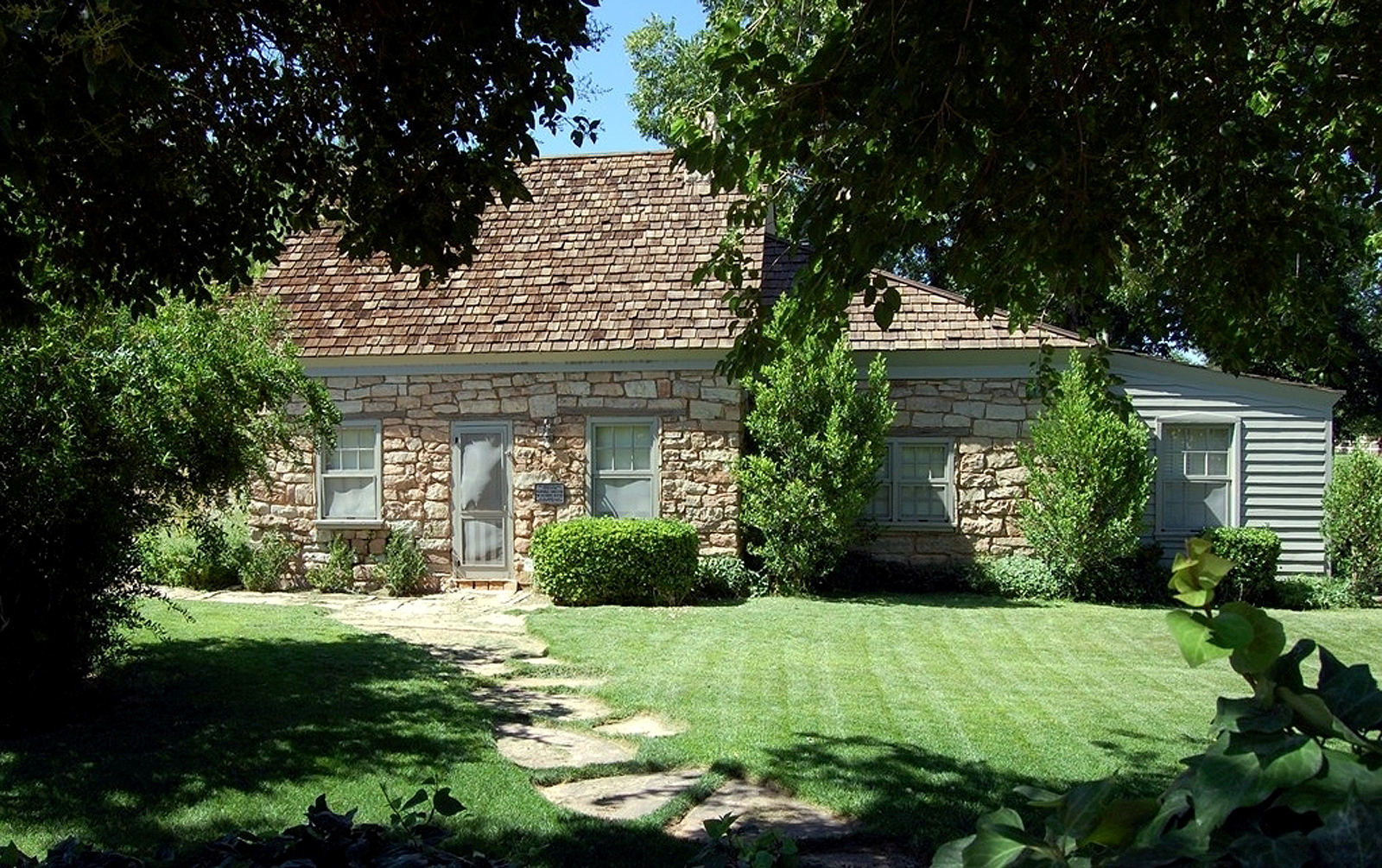 Grandpa and Grandma McCain's home in Bloomington
Grandpa and Grandma McCain's home in Bloomington
After Grandpa and Grandma McCain decided they had had enough living in that dry harsh country and traded their homestead for a farm in Bloomington, Utah, we stayed a year or two longer. Then my Dad's herd of cattle got the deadly disease of "hemerogic septasena" and one after the other took down sick. They tried to doctor them but they began dying so he sent for a vet to come out from St. George to see what he could do. He's the one that told him what it was and he gave shots to the young heifers that were still well and saved them but all his milk cows died. It was heart breaking to watch them and him and I still can feel the sorrow of it even though I was young.
After that my Dad too gave up on Arizona and we moved to Bloomington also. He took the heifers he had left (about 15) and sold them down there. A little later we moved east across the Virgin River from Bloomington and rented a farm in a little farming area called Price, just south of St. George. It was real sandy, loamy soil.
Here he farmed. Got a few more cows and I remember he raised lots of good melons to sell. We used to work hard hoeing and killing the squash bugs on regular days to keep them from killing the plants.
We had some good neighbors here with a girl just a little younger than me and a boy a little older. This was Sheila and Romain Stutznecker. We had a lot of fun times together.
We kids used to have to go five miles into St. George to school so we usually drove a one horse buggy with no top. We used an old brown mare named Maud. We had to cross the Virgin River to get to St. George. We would drive up to a certain place at the edge of town and tie the horse up to the buggy and give her some hay to eat, and then walk to school. One day Old Maud got loose and went back to her old home where my Dad had bought her but we thought maybe she had gone home so I walked home taking the rope with me. Budd went looking around town and finally found her but then he didn't have a rope so he took his shirt and made a line to lead her and got her back to the buggy. I believe my Dad went up to meet him with the rope.
Sometimes we girls, Sheila and I, would get in the front and drive and the boys would ride in the back with their feet dangling out and sometimes visa versa. Once Budd whipped up the horse so quick that we girls fell out in the sand by the river. So when we were coming home we did the same for the boys and went on and made them walk a couple of miles to home.
How well I remember the hot summers when we lived in Price. How us barefoot kids would run from the shade of one bush to another just like the lizards did because the sand was so hot.
One Christmas while we were living her we didn't have a Christmas tree so we kids all went out in the foot hills and got a nice sage brush to use as a tree. We decorated it with colored paper chains, popcorn and a gold star in the top. It was a happy, very special Christmas.
In the spring large herds of sheep usually came through the hills near our place so we kids would out and ask the herders if they had any bum lambs. Sometimes they would give us some. We were really thrilled when we got one.
Next we bought an acreage up about a mile south of St. George and built a small lumber home. We were living her when Archie Ray was born. We could walk to school from there while we lived here we would visit my Grandma Iverson quite often where she lived in the little house by the temple. I and some girl friends started going to some of the dances. They had an open air pavilion here for dances in the open air. We also went to quite a few movies but I sure hated to walk home alone in the dark.
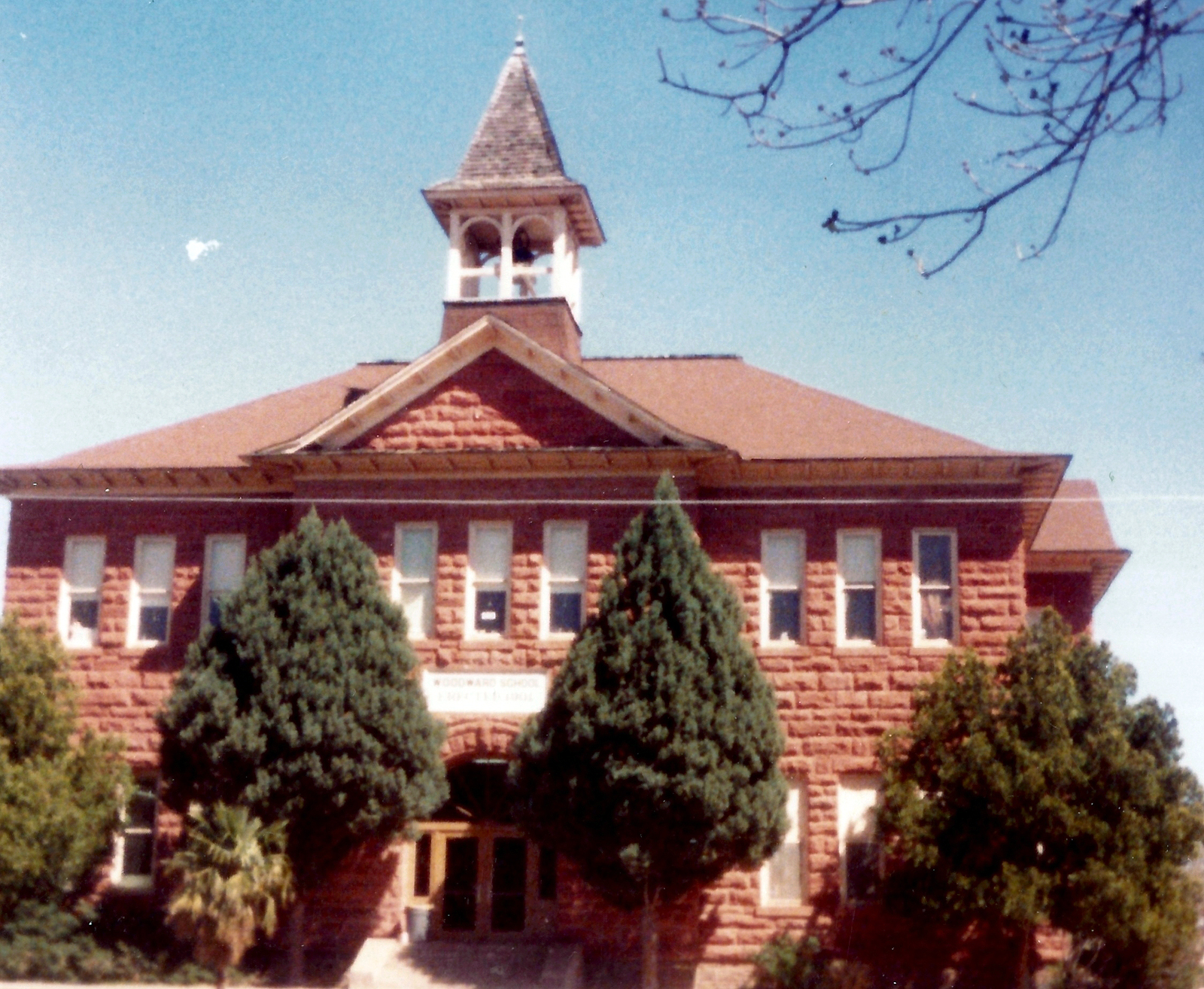 Woodland School in St George
Woodland School in St George
Aunt Mary's sons, Robert and Arthur stayed with Grandpa and Grandma McCain most all the time when they were in Mt. Trumbull and when they lived in Bloomington. Aunt Mary worked in Ogden and Salt Lake. While in Bloomington some of us cousins and the other young people from Bloomington went swimming in the river and had wiener roasts on the banks. We rode horses all over the country. We rounded up wild donkeys from off the lower Virgin and had rodeos. Can't you just see me on a bucking donkey? It did it a few times. We rode them bare back with just a rope around their middle to hang onto. We loved to play Run, Sheep, Run all over the country side at Bloomington and Price.
I went to the seventh and eighth grades in the Woodland School in St. George. Students had to pay tuition to attend high school. My parents couldn't afford the tuition so we didn't know how I would be able to go. My parents had real good friends, Myrtle and Howard Pulsupher, that lived in Mesquite, Nevada. We had known them way back at the Gyp camp where my sister Bernice had taken sick. They had a Bernice too that was my age. They asked me to come stay with them to go to Virgin Valley Hish School in Bunkerville, Nevada.
Some of our closest friends were the Carpenter family. I went with Lester Carpenter for a while. He and I talked some of getting married. When I told him that I wanted to go to high school in Bunkerville, he told me if I went down there to go to school I would meet someone else and marry him. He said "If you do I never will marry anyone else." The last I knew he never did. I've always felt bad about that and sorry for him.
I did move to Mesquite and lived with the Pulsiver family. Bernice and I rode the bus to Bunkervill for school. We both got jobs as ushers in the Mesquite theater.
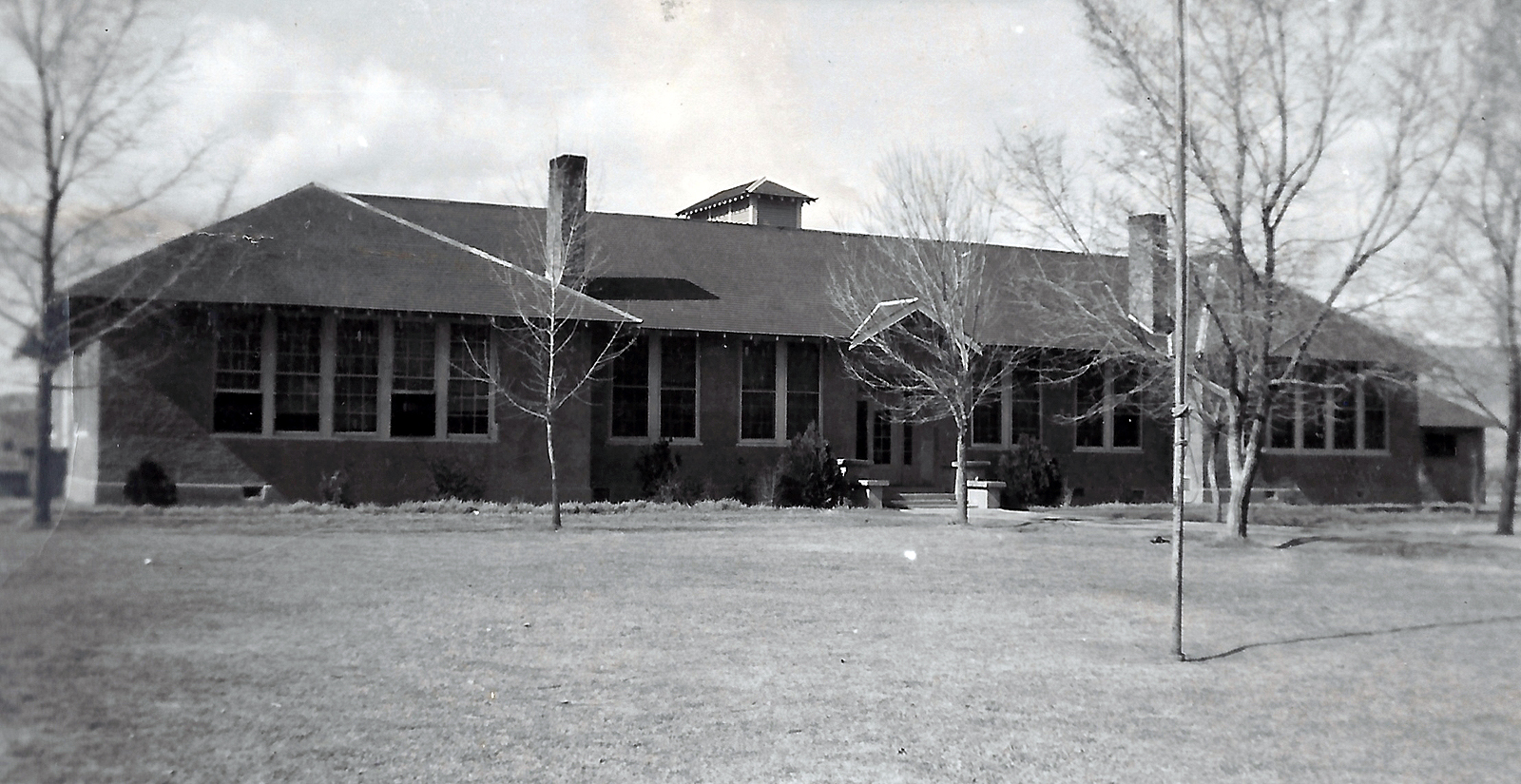 Vigin Valley High School in Bunkerville
Vigin Valley High School in Bunkerville
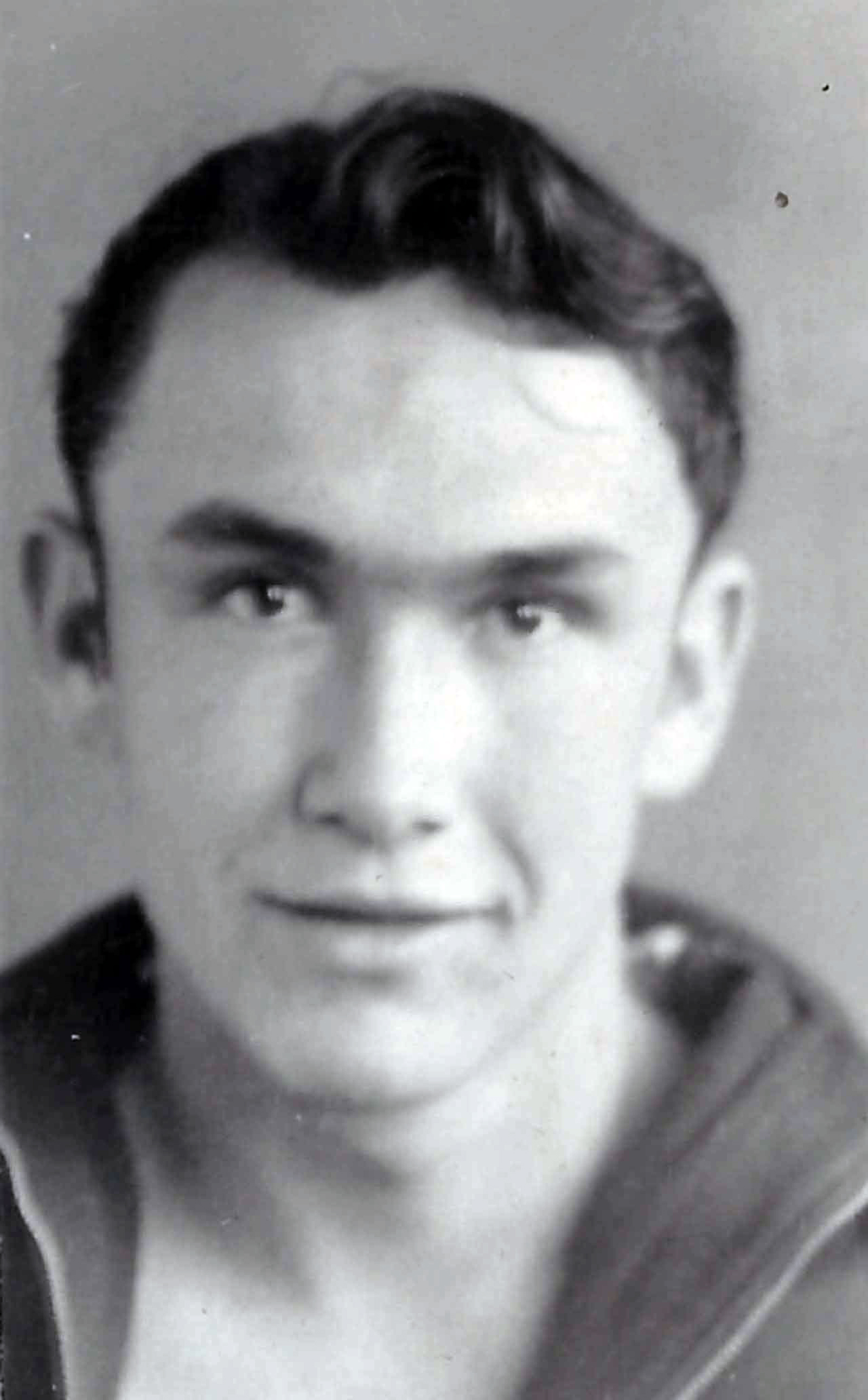 Rodney Waite
Rodney Waite
In my freshman year I met Rodney Waite. At first he impressed me as a show off but he soon became a good friend of mine. In fact he was a good friend to most all the girls. My sophomore year I stayed with Emily and Elmer Hughs in Bunkerville and worked for my board and room. They had a young baby and asked me to stay with them to help with her. During the summer after I started school I worked as a waitress at Big Hand Cafe in St. George.
I dated some of the boys in school my sophomore year then Rodney and I started going steady. After my sophomore year I worked as a waitress at Beaver Dam Lodge at Beaver Dam Arizona. Rodney would come up to see me on the Union Pacific Bus. We loved to go to dances and I would rather dance than eat. I was like the song entitled "I Could Have Danced All Night". Rodney was a good dancer and so were his brothers, Dan and Moroni. They could really swing a girl around the floor. Most of their close fiends were good, fun dancers too. We just danced and had good, clean fun.
In my junior I lived in Bunkerville with Vincent and Erma Leavitt. Erma was going to have a baby and needed some help. So I stayed with them. I really liked each each of the families I lived with, they all treated me as a member of their family.
That winter Bunkerville recieved about 6 inches of snow, which was very rare for that country. everyone was thrilled and excited. we had a nice art teacher, Mr. Patterson, who was really quite serious and dignified. One day as we were all changing classes and going from one building to another we saw Rodney pick Mr. Patterson up on his shoulder and dump him in the snow on the lawn. Everyone was whooping and hollering except Mr. Patterson and his dignity was a little ruffled, but it didn't bother Rodney. He loved to play jokes on people and always got away it.
We had lots of fun during our high school years. We went to lots of basketball games and track meets. Rodney was always one of the main five players and went to other towns to play ball a lot. Sometimes they took the school bus so others could go. Once I was in a Dance Festival that was real fun and we took it to Las Vegas to put it on. I was in the band. I played the flute and sometimes the cymbals and we went around the country to different towns including Cedar City and Las Vegas.
Rodney was from a good active LDS family. He was the youngest of 12 children. I really liked his whole family, especially his borthers Dan, Denzel and Moroni.
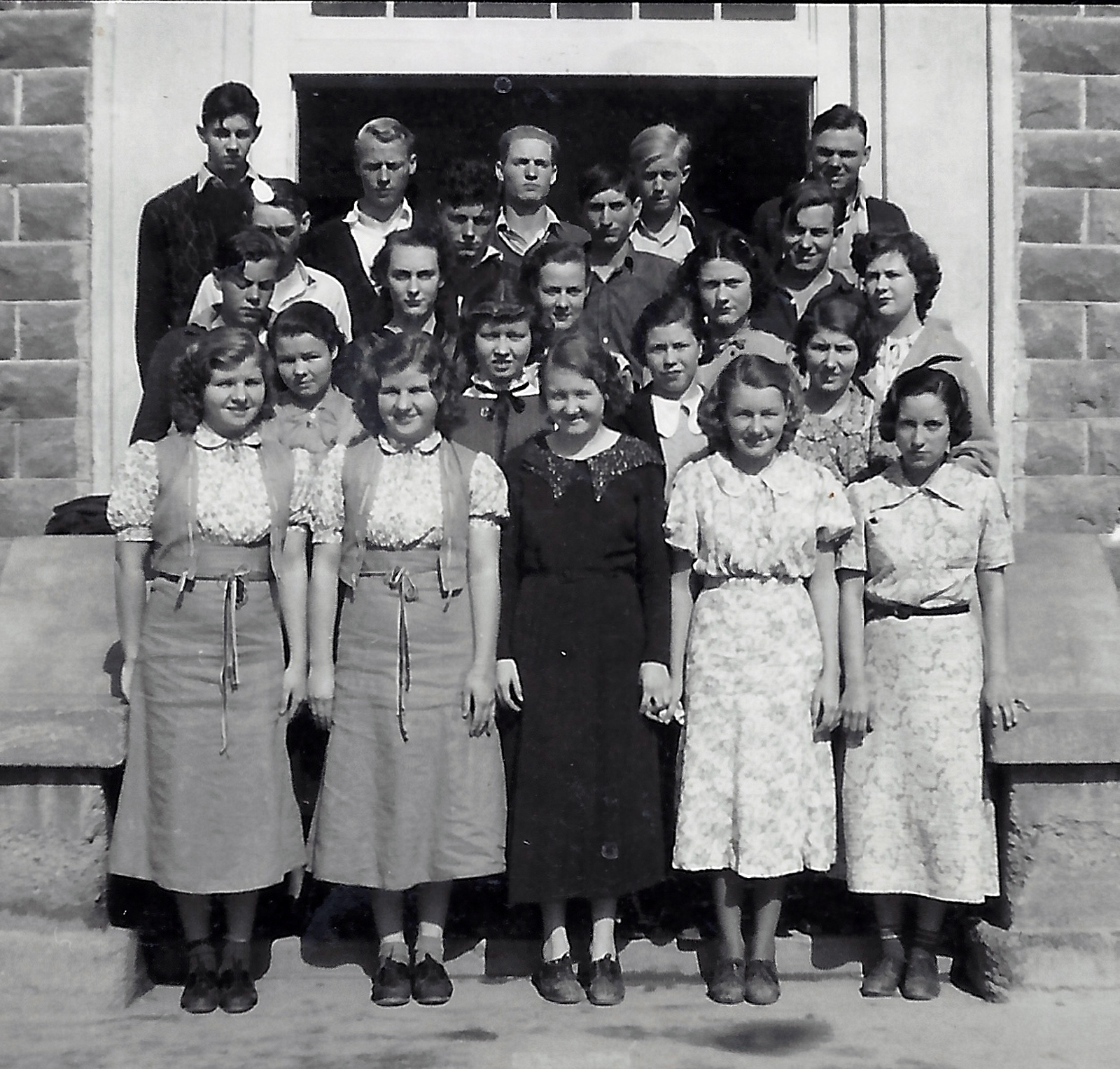 My Junior Class, I am on the left of the second row
My Junior Class, I am on the left of the second row
I went with Rodney on his senior sneak trip. We all went on a school bus to Bryce Canyon and we had a lot of fun. It was early in the spring, so we couldn't go on to Grand Canyon as we had planned, because it was still closed because of snow.
After Rodney graduated in May, 1938 I went to St. George to work again as a waitress in the Big Hand Cafe. Rodney rode the bus to see me several times. The depression was still on so we didn't have much money to spend on entertainment. He stayed at my folks place and helped my father make bricks from gypsum. After he went home he picked cantalope in Moapa Valley to earn money.
I have many childhood memzzories. Some are very good and sacred to me. Some are sad painful to remember. I love my parents and brothers and sisters very much, but it seems that our life was hard and deprived. I never had the good clothes and things girls my age usually had, so I felt inferior. My father was sick and not able to work steady and provide a good living for his family. This bothered him and made him depressed, which probably added to his illness.
I certainly am thankful for the teachings and example of my father and mother. They taught us the gospel. We prayed daily as a family. We saw the strength of the Holy Priesthood as a healing power in our home. All of these things prepared me for my life as a married woman.